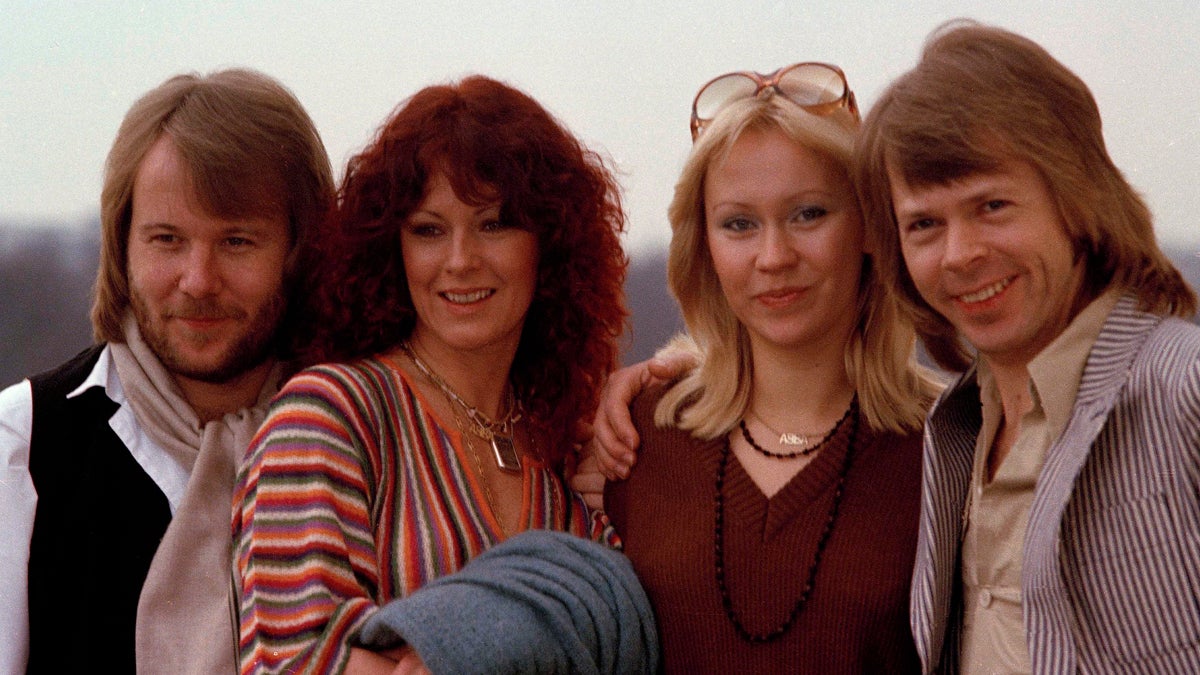The healing power of yesterday’s music

Members of the Swedish pop group ABBA are shown together in London in 1978. From left: Benny Andersson, Anni-Frid Lyngstad, Agnetha Faltskog and Bjorn Ulvaeus. (AP Photo)
What draws us to the music of our youth? Is it because our dreams are still developing, and hopefulness is not yet replaced by cynicism? The melodies and words take me back to a somewhat simpler time, before all the technology we now have — iPods, iPads, satellite radio — that allows us to listen to music on the go.
Earlier this fall my husband and I went to the Kimmel Center for a 1970s “Era of ABBA” concert. The Philly Pops performed a string of hits from that decade, and Finnish vocal ensemble Rajaton sang a collection of ABBA songs.
Perfectly, on the way there, “Only Yesterday,” a top–of-the-charts song from 1975 sung by one of my favorite singers, Karen Carpenter, played on the car radio. The lyrics immediately triggered feelings of nostalgia. How prophetic!
By the time we took our seats, primed by The Carpenters, I was already longing for the sound of the ’70s. As we sat waiting for the concert to begin, I glanced around the hall and realized that almost everyone was over 50: boomers and beyond, anticipating the music of our younger days. We were not disappointed.
What draws us to the music of our youth? Is it because our dreams are still developing, and hopefulness is not yet replaced by cynicism? The melodies and words take me back to a somewhat simpler time, before all the technology we now have — iPods, iPads, satellite radio — that allows us to listen to music on the go.
The music of my teenage and college years takes me back to an afternoon with my best friend, hanging out in the bedroom and just listening to the music we loved on our LPs or, even earlier, on vinyl records! We dreamed about dances and proms, communicating face-to-face, not texting. Is that what I long for that makes the music so important?
Perhaps one side effect of nostalgia is the ability to erase the bad and relive the good. Just as the lovely aroma of your mother’s chicken soup or your grandmother’s marinara sauce evokes memories of happy childhood dinners, our favorite songs evoke positive feelings and smooth over the unexpected harsh realities we face as adults, especially when we identify strongly with the lyrics.
Just as Norman Cousins used laughter to heal, I think music we listened to when we were growing up can make us actually feel better, if only for a few minutes. Music as therapy definitely has a place in our hectic way of life. It lifts us and helps snap us out of a bad attitude. If familiar music comes on in the elevator or supermarket, stop for a moment to just listen, and see if you don’t feel lighter.
Actually, research shows that Alzheimer’s patients can remember the songs of their youth, even though they may not recognize their own children. The part of the brain that recalls lyrics is not affected. So familiar music does have a certain “magic” to it.
Of course, some music is ageless, like the Beatles or ABBA, and we can share it with our children and grandchildren. My youngest daughter loves The Mamas and the Papas, and my older daughter loves Billie Holiday, so we can listen to the songs together. I call this “classical” pop music, and it can span generations.
Whatever the reasons for clinging to the music of our youth, they make us feel younger and more alive. By the time Rajaton came back for an encore of “Waterloo,” the mostly senior audience was on its feet, swaying to the music and singing.
For my own souvenir, I bought a CD with all the ABBA songs I love. The nostalgia triggered at that concert certainly lightened and brightened my day, and the CD allows me to relive those feelings over and over.
WHYY is your source for fact-based, in-depth journalism and information. As a nonprofit organization, we rely on financial support from readers like you. Please give today.

